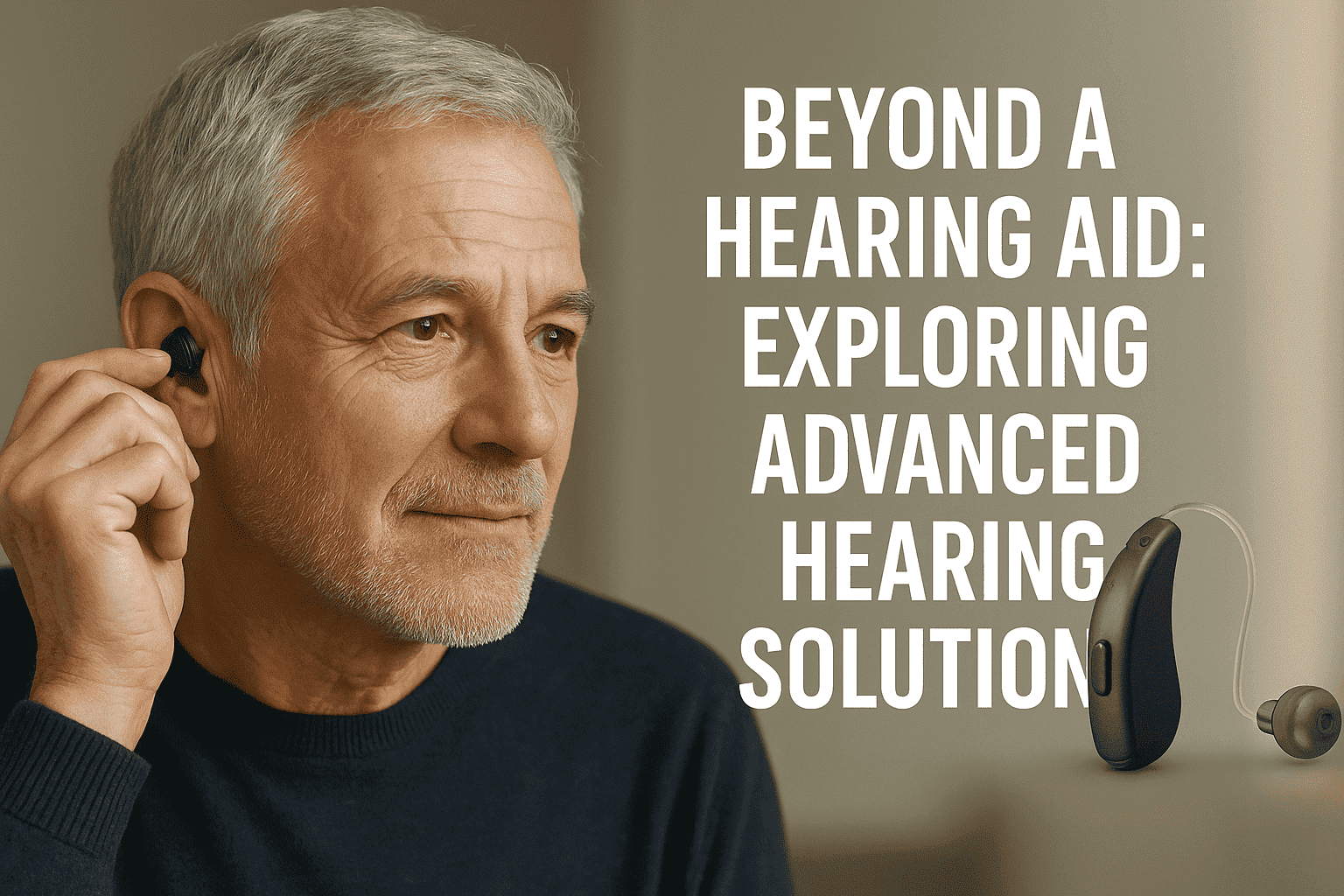Table of Contents
Hearing aids have long been the standard solution for individuals experiencing hearing loss. However, with advancements in hearing enhancement tech and personalized auditory care, there are now a variety of options that go beyond a hearing aid. These solutions include cochlear implants, assistive listening devices, tinnitus therapy, and other communication solutions that improve overall hearing and quality of life.
This guide explores modern alternatives, technology innovations, and professional services to help you make informed decisions about your hearing health.
Why Look Beyond Traditional Hearing Aids?
Traditional hearing aids amplify sound, which can be effective for mild to moderate hearing loss. However, some individuals may face limitations:
- Difficulty in noisy environments
- Challenges with high-frequency sounds
- Limited benefit for severe or profound hearing loss
- Persistent tinnitus or ringing in the ears
For these cases, exploring advanced hearing enhancement tech and complementary solutions can significantly improve hearing clarity and communication.
Professional hearing assessments, such as pure-tone audiometry, ABR/ASSR, and tympanometry, can determine whether you need conventional hearing aids or advanced interventions.
Cochlear Implants: A Life-Changing Option
For individuals with severe to profound sensorineural hearing loss, cochlear implants offer a transformative alternative. Unlike hearing aids, which amplify sound externally, cochlear implants bypass damaged hair cells in the inner ear and directly stimulate the auditory nerve.
Key benefits of cochlear implants include:
- Improved speech perception in quiet and noisy environments
- Access to a wider range of sounds
- Integration with modern assistive listening devices and Bluetooth technology
Cochlear implant services at The Hearing Centre Singapore include pre-surgical assessment, implantation, and post-operative auditory rehabilitation for optimal outcomes.
Assistive Listening Devices: Enhancing Everyday Hearing
Assistive listening devices (ALDs) complement traditional hearing aids or implants by improving sound clarity in specific situations. They are especially useful in:
- Classrooms and lecture halls
- Theatres or cinemas
- Telephone and video communication
- Group conversations in noisy environments
Common ALDs include:
- FM systems – Transmit a speaker’s voice directly to your device
- Remote microphones – Reduce background noise and improve speech understanding
- TV streamers and phone adapters – Allow direct audio input from digital devices
These devices are part of comprehensive communication solutions that ensure you can engage fully in daily life.
Tinnitus Therapy: Addressing Ringing in the Ears
Many individuals seeking hearing support also experience tinnitus, a persistent ringing or buzzing in the ears. Modern hearing solutions can provide relief through:
- Sound therapy – Uses customized noise or music to reduce tinnitus perception
- Combination devices – Hearing aids that integrate tinnitus masking features
- Behavioral therapy – Cognitive strategies to manage tinnitus-related stress
Professional guidance at clinics like The Hearing Centre Singapore ensures that tinnitus therapy is tailored to your unique needs.
Advanced Hearing Enhancement Technology
The evolution of hearing enhancement tech has introduced features far beyond amplification:
- Digital signal processing – Improves speech understanding in noisy environments
- Artificial intelligence (AI) – Automatically adjusts settings based on the listening environment
- Connectivity with smart devices – Stream audio from phones, TVs, or computers directly to hearing devices
- Rechargeable solutions – Eliminate the hassle of disposable batteries
Modern hearing aids from top brands like Signia, Phonak, and Starkey incorporate these advancements, offering seamless integration into daily life.
Combining Hearing Devices with Communication Solutions
For optimal hearing outcomes, consider pairing hearing devices with broader communication solutions:
- Video captioning apps – Provide visual support during phone or video calls
- Text-to-speech software – Helps in meetings and educational settings
- Environmental sound recognition – Alerts for alarms, doorbells, or notifications
Integrating these tools with professional services at The Hearing Centre Singapore enhances your overall auditory experience.
Professional Support and Fitting
Even the most advanced devices require proper fitting and professional support:
- Ear measurements – Customized moulds ensure comfort and optimal sound transmission (ear measurement services)
- Device programming and calibration – Adjusts sound settings for your specific hearing loss
- Follow-up and adjustments – Regular check-ups help maintain performance and comfort (hearing aid repairs and adjustments)
Accurate fitting and continuous support are key to getting the most out of hearing enhancement tech.
Lifestyle Benefits of Going Beyond a Hearing Aid
Investing in advanced hearing solutions goes beyond simply amplifying sound. Modern devices and integrated technologies provide holistic benefits that enhance daily life, mental health, and social interactions.
1. Improved Communication
Advanced hearing aids and hearing solutions enable clearer conversations in a variety of settings, including:
- Family gatherings, where multiple voices overlap
- Work meetings or presentations
- Social events with background noise
Better communication reduces misunderstandings, strengthens relationships, and allows for more active participation in everyday activities.
2. Enhanced Cognitive Health
Studies have shown a strong connection between hearing health and cognitive function. By addressing hearing loss:
- The brain receives clearer auditory signals, reducing cognitive load
- Focus, attention, and memory improve
- The risk of cognitive decline and mental fatigue decreases
Advanced hearing solutions can thus play a role in maintaining overall brain health.
3. Increased Confidence and Independence
Modern hearing aids and integrated devices allow users to rely less on others for repeating information or clarifying conversations. Benefits include:
- Greater autonomy in daily routines
- Confidence in professional and social situations
- Freedom to participate in activities without hesitation
This independence can positively affect mental well-being and self-esteem.
4. Improved Quality of Life
Beyond functional hearing, advanced solutions enhance overall enjoyment of life:
- Music, podcasts, and media are richer and more detailed
- Environmental sounds such as birdsong, traffic, and social cues become clearer
- Outdoor activities and travel are more accessible and enjoyable
By embracing technology that goes beyond basic amplification, users gain a more immersive and satisfying auditory experience.
5. Personalized Hearing Experience
Modern hearing solutions offer customizable settings and smart features, including:
- AI-driven sound adaptation for different environments
- Smartphone apps to adjust volume, program modes, or streaming options
- Connectivity with other smart devices for seamless audio experiences
These features allow users to tailor their hearing experience to personal preferences and lifestyle needs.
6. Long-Term Benefits
Investing in advanced devices may also contribute to long-term hearing preservation by reducing auditory strain, improving speech comprehension, and maintaining ear health.
By exploring options beyond a traditional hearing aid, users achieve a holistic approach to hearing health, improving social interactions, cognitive performance, and overall quality of life.
Future Trends in Hearing Solutions
The field of audiology is rapidly evolving, with new technologies enhancing hearing aid functionality, comfort, and user experience. Staying informed about these advancements allows users to benefit from the latest innovations and select solutions that best meet their hearing needs.
1. AI-Driven Hearing Devices
Modern hearing aids increasingly incorporate artificial intelligence to automatically adapt to changing sound environments. These AI-powered devices can:
- Distinguish between speech and background noise
- Optimize amplification in real-time
- Learn user preferences over time for a more natural listening experience
2. Hybrid Cochlear Implant-Hearing Aid Systems
Hybrid systems combine electrical and acoustic stimulation, providing improved hearing for individuals with both low- and high-frequency hearing loss. These systems enhance speech clarity and overall sound perception, bridging the gap for patients who may not benefit fully from conventional hearing aids alone.
3. Wearable Health Monitoring
Hearing aids are evolving into multi-functional wearable devices that track health metrics in addition to improving hearing. Features include:
- Monitoring ear canal health and moisture levels
- Tracking device performance and battery status
- Integrating with smartphones for real-time feedback and alerts
4. Advanced Tinnitus Therapy Integration
Many new hearing solutions now incorporate personalized sound therapy for tinnitus. Connected devices can deliver tailored sounds to mask or reduce the perception of tinnitus, providing relief and improving quality of life.
5. Rechargeable and Eco-Friendly Designs
Future hearing aids are moving towards rechargeable batteries and energy-efficient designs, reducing environmental impact while offering convenience and long-term cost savings.
6. Connectivity and Smart Apps
Next-generation hearing aids offer seamless integration with smartphones, smart home devices, and streaming services, allowing users to adjust settings remotely, track usage, and access personalized listening programs via apps.
7. Miniaturization and Discreet Design
As technology advances, devices continue to shrink in size without compromising performance, resulting in more comfortable, discreet, and cosmetically appealing options for users.
8. Personalized and Data-Driven Solutions
Future hearing solutions increasingly rely on data-driven customization, where audiologists can monitor usage patterns, environmental exposure, and hearing trends to fine-tune devices for maximum benefit.
By staying informed about these emerging trends, users can access the most innovative, effective, and convenient hearing solutions, ensuring better hearing outcomes and overall well-being.
Conclusion
Going beyond a hearing aid means embracing the full spectrum of modern auditory solutions. From cochlear implants and assistive listening devices to tinnitus therapy and advanced hearing enhancement tech, there are numerous ways to improve hearing and communication.
Professional evaluation and support at The Hearing Centre Singapore ensure personalized care, optimal device fitting, and continuous follow-up. By exploring these advanced options, you can achieve not only better hearing but also enhanced engagement, confidence, and overall quality of life.
Frequently Asked Questions:
It refers to advanced hearing solutions like cochlear implants, assistive listening devices, and tinnitus therapy that go beyond traditional amplification.
Cochlear implants are designed for individuals with severe to profound sensorineural hearing loss who do not benefit adequately from hearing aids.
ALDs are supplementary devices that enhance hearing in specific situations, such as classrooms, theatres, or noisy environments.
Tinnitus therapy uses sound masking, behavioral techniques, and specialized hearing devices to reduce the perception of ringing or buzzing.
Yes, modern hearing devices often include Bluetooth connectivity for seamless audio streaming.
Regular check-ups are recommended to ensure proper function, comfort, and optimal performance.
Costs vary depending on the device, technology, and services. Clinics can provide detailed estimates and financing options.
Yes, children can benefit from cochlear implants, hearing aids, and assistive listening devices tailored to their needs.
Improved communication, better cognitive health, enhanced confidence, and a higher quality of life.
Professional services like The Hearing Centre Singapore offer assessments, device fitting, and ongoing support.

Evlin is passionate about helping people with hearing loss. With years of experience in audiology, she has diagnosed and treated a wide range of hearing conditions across all age groups. She is accredited to conduct comprehensive hearing assessments and provide treatments for patients from newborns to the elderly. Committed to personalized care, she strives to empower patients to fully engage in life with better hearing.
Designation: Clinical Audiologist
Qualification: Bachelor of Health Science (Honours) (Audiology), University of Science Malaysia
Membership: .Society of Audiology Professionals in Singapore (SAPS)
